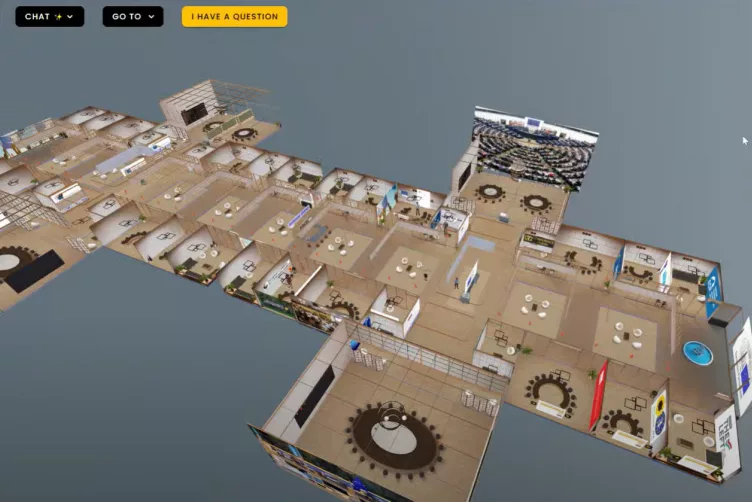Simulation Game
The simulation game gives participants the opportunity to take on different roles in the European legislative process: Members of the European Parliament, representatives of the Council of the EU, or lobbyists. The aim is to jointly negotiate legislative proposals and, in doing so, to gain an intuitive understanding of the complex processes of European lawmaking in a playful and engaging way.
The virtual environment serves as a space for self-experience, characterized by unrestricted accessibility. It fosters self-directed engagement within the parameters of the simulation. The instructor acts as a coach and moderator, guiding participants both during the preparation phase and throughout the simulation itself.
The virtual learning environment provides a valuable complement to classroom teaching and e-learning platforms by creating a collaborative setting in which participants can support one another and share knowledge. Dedicated online spaces are designed for peer exchange as well as for accessing information at any time—whether through consulting documents or interacting with an AI chatbot.


Video about the virtual learning environment
At the University of Applied Sciences BFI Vienna, the simulation will gradually be expanded so that ultimately students from four different courses will participate jointly. In the winter semester, students from two courses work on the legislative proposal selected for that academic year. Participants in the BA course “Policy Analysis in the European Context” prepare the draft legislation by analyzing it against the policy objectives and conducting an impact assessment. Based on these findings, participants in the MA course “Public Affairs in the EU”—representing interest groups—develop the positions of their respective umbrella organizations. These positions are then integrated into AI chatbots within the virtual learning environment and serve as an additional knowledge base for the following student groups in their decision-making within the Council of the EU and the European Parliament.
Students in the MA course “Analysis of Political Systems in Austria, Germany, and the EU” simulate negotiations in the Council of the EU, while students in the BA course “Governing in the European Multi-Level System” act as Members of the European Parliament to deliberate on the same legislative proposal, taking into account the Council’s position. Following the simulation, all participants write a reflection paper in which they link their insights to the subject matter of their respective courses.
The virtual format allows participation regardless of physical location or time zone, which is a significant advantage especially for internationally composed groups. One of the project’s key goals is to implement and establish the simulation game as part of inter-university teaching at universities in Austria, across the EU, and in EU neighboring countries.
If you are interested in implementing the simulation game at your institution, please contact us via E-Mail bernhard.zeilinger@fh-vie.ac.at.
Currently, three fully developed simulation scenarios are available. The Manuals will be available for Download by February 2026.
Feedback
By October 2025, more than 650 students from 16 courses across five universities had already taken part in one of the simulation games. The consistently positive feedback from instructors and students highlights the simulation as an innovative and effective complement to traditional teaching methods, making European lawmaking more tangible, engaging, and relevant. Below is a selection of participant feedback gathered through diverse evaluation and reflection processes:
“Participating in the simulation of the European Parliament was a truly eye-opening adventure. […] Overall it was an amazing experience, and honestly this made everything clear and explained how the parliament works.”
“The knowledge stays longer when transferred through a game, you are part of the process, you experience it. It’s great.”
„Experiencing the limits, challenges and needed skills a politican needs to have, including time pressure, negotiating skills, framing of your reform proposals”






